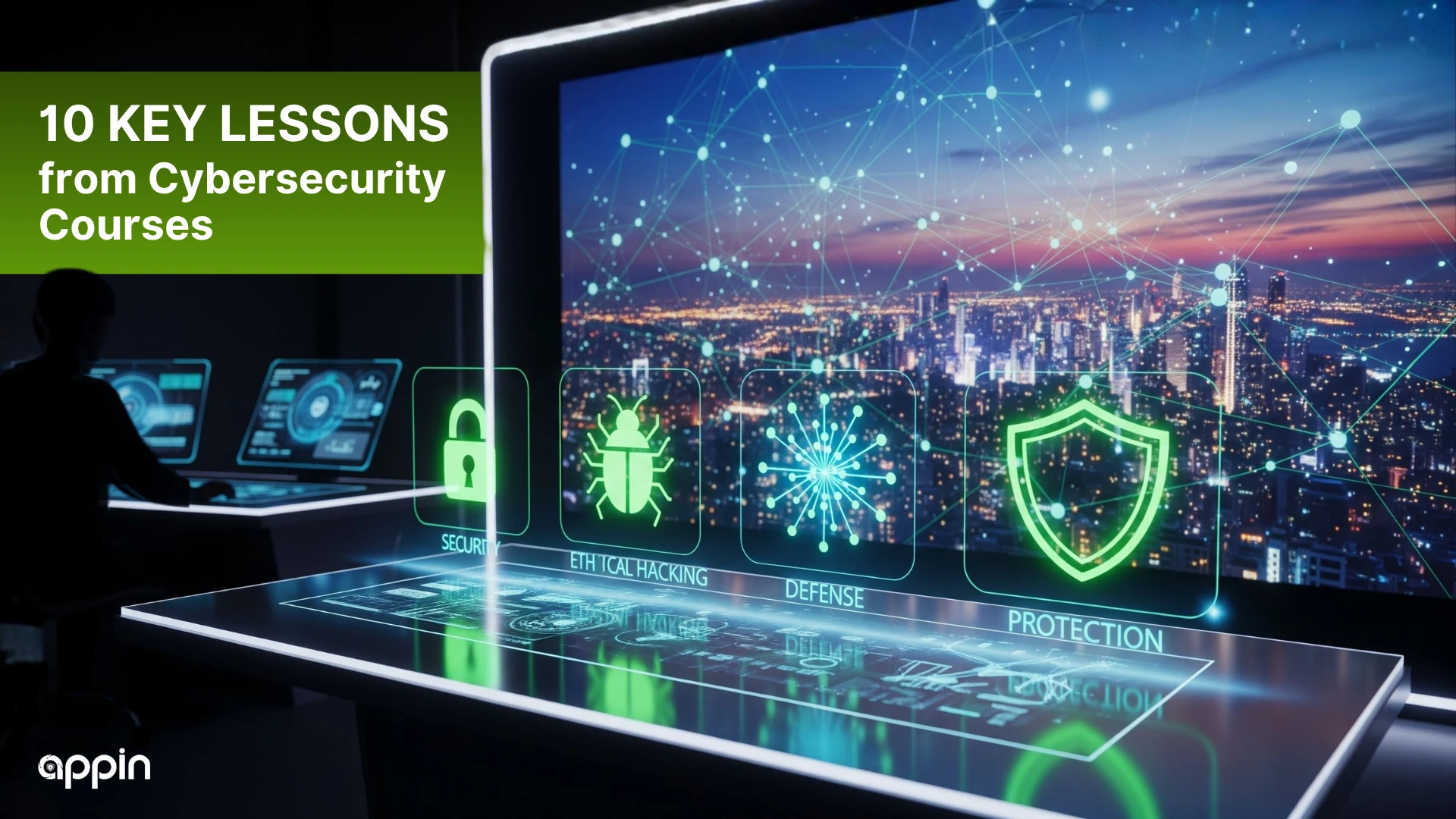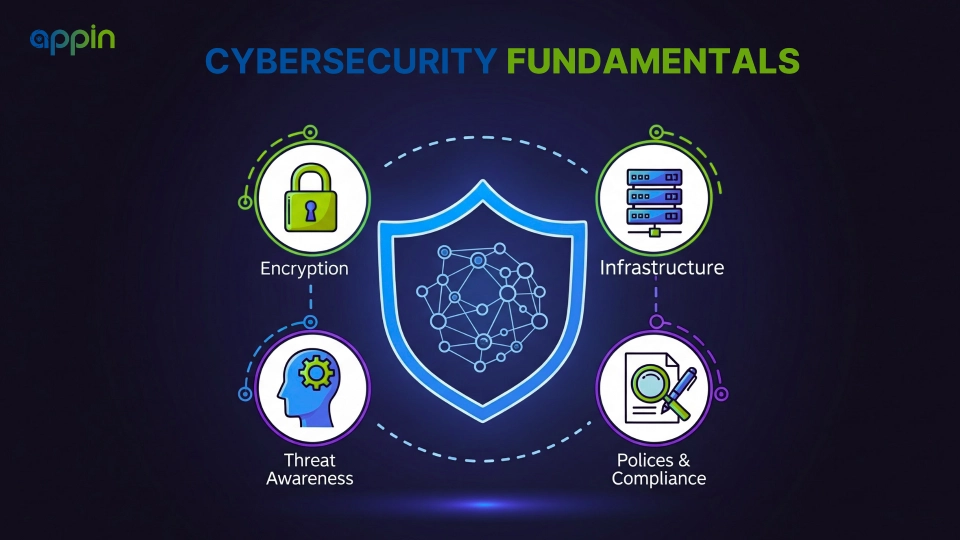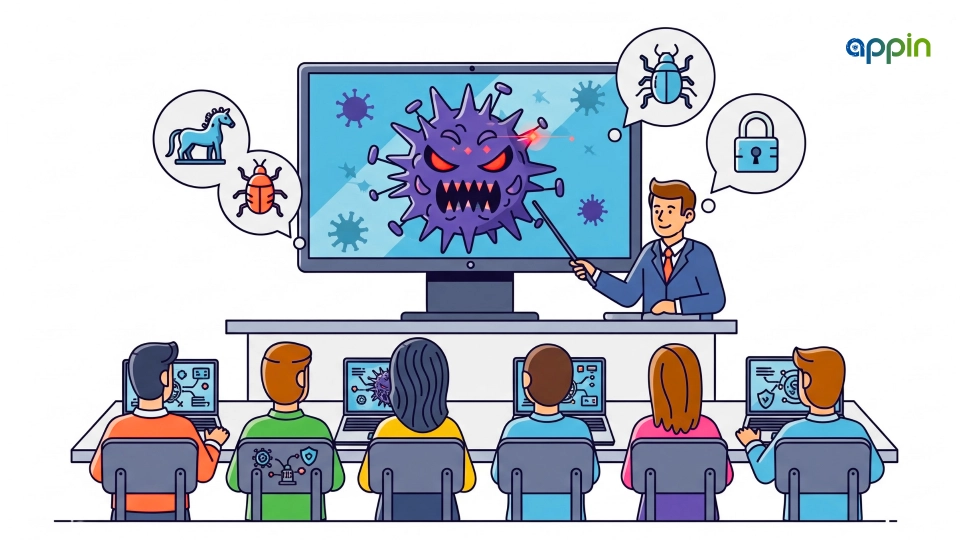Why should you know what a cybersecurity course teaches before joining?
Understanding what you learn in a cybersecurity course is important because it helps you set clear expectations about skills and career outcomes. Many students join programs without knowing what topics will be covered or how they apply in practice.
A cybersecurity course in India is designed to teach both theory and hands-on skills. You not only study how cyberattacks work but also practice defending against them using tools and methods professionals use every day. This balance makes you job-ready and gives you confidence to handle real-world challenges.
Knowing the key areas you will learn also helps you align your course with your career goals. For example, if you want to become an ethical hacker, networking and penetration testing will be highly useful.
In this blog, we will explore 10 important things you will learn in a cybersecurity course and how each one applies in real life.
What will you learn about cybersecurity fundamentals?
You will learn cybersecurity fundamentals, including the types of threats, attacks, and defenses that form the base of the field.
Every course begins with the basics of cybersecurity so students can build a strong foundation. These fundamentals explain how cyberattacks work, what risks exist online, and the strategies used to stop them.
Key concepts usually include:
- Common threats like phishing, ransomware, and denial-of-service attacks.
- Security principles such as confidentiality, integrity, and availability.
- Methods for protecting data and systems from unauthorized access.
In real life, these lessons translate into secure habits like using strong passwords, avoiding suspicious links, and keeping your software updated. They also prepare you to think critically about security in both personal and professional contexts.
Employers often expect candidates to understand these basics before moving to advanced roles. Without a solid foundation, higher-level skills like penetration testing or incident response are difficult to master.
If you are new to the field, starting with a Cyber Security Certification ensures you cover these fundamentals in a structured way, giving you the confidence to progress toward specialized skills.
In short, learning cybersecurity fundamentals is like learning the alphabet before writing sentences. They are essential building blocks for every role in the industry.
How does networking knowledge help in cybersecurity?
Networking knowledge helps in cybersecurity by teaching you how data travels across systems and how attackers exploit weak points in networks.
Networking forms the backbone of the internet and corporate systems, so understanding it is vital. In a course, you will study networking in cybersecurity concepts like TCP/IP, DNS, routing, and switching. These are often taught at a beginner-friendly level so even non-technical students can follow.
Key areas include:
- TCP/IP basics for beginners, showing how communication works between devices.
- How firewalls, VPNs, and intrusion detection systems protect data.
- Identifying risks such as open ports or weak configurations that hackers target.
In real life, networking skills help you secure home Wi-Fi, prevent unauthorized access to office systems, and recognize unusual traffic patterns that could signal an attack. They also make you comfortable with tools like Wireshark or Nmap, which are standard in the industry.
For students aiming at roles like Security Analyst or Network Security Engineer, strong networking knowledge is non-negotiable. It is the link between theory and the practical defense of systems.
Why is learning about operating systems important?
Learning about operating systems is important because attackers often target weaknesses in Windows, Linux, and mobile platforms.
In a cybersecurity course, you study how different systems work, since every environment has its own security needs. Students learn about operating systems in cybersecurity, focusing on file structures, permissions, and common vulnerabilities.
Key areas usually include:
- Basics of Windows administration, user accounts, and registry settings.
- Linux command line for managing files and processes.
- Security gaps in mobile operating systems like Android and iOS.
In real life, this knowledge helps you spot risks in everyday devices. For example, knowing about privilege escalation teaches you why limiting admin rights on a shared computer is important. Understanding Linux for cybersecurity also makes you more versatile, as many servers worldwide run on Linux.
Employers value candidates who can work across multiple platforms. Whether you are troubleshooting a malware infection on Windows or checking server logs in Linux, operating system knowledge ensures you are ready.
This area of learning gives you a practical edge, as almost every role in cybersecurity requires comfort with system-level details.
What do you learn about ethical hacking and penetration testing?
You learn how to think like a hacker by using tools and methods to test systems legally through ethical hacking and penetration testing.
In most programs, students receive ethical hacking training that introduces them to techniques hackers use, but in a safe and controlled environment. The aim is to identify flaws before cybercriminals exploit them.
Core skills include:
- Penetration testing basics like scanning, enumeration, and exploiting vulnerabilities.
- Using tools such as Burp Suite, Metasploit, and Nmap.
- Writing reports that explain how issues were found and how to fix them.
In real life, this translates to jobs where you test company networks, applications, or websites to strengthen their defenses. Companies pay professionals to do this because the cost of prevention is far less than the damage of a breach.
For students aiming to enter an ethical hacking career, completing a program like Certified Ethical Hacking provides a recognized path. It ensures you learn responsibly and follow rules of engagement while testing systems.
By learning penetration testing, you gain not only technical skills but also the problem-solving mindset needed to outthink attackers.
How do courses teach about malware and viruses?
Courses teach about malware and viruses by explaining their types, behavior, and prevention methods.
Students learn the basics of malicious software, including worms, ransomware, spyware, and trojans. By studying the types of malware, you understand how attackers create programs to steal data or disrupt systems.
Key lessons often cover:
- How viruses spread through email attachments or infected USB drives.
- How ransomware locks files until payment is made.
- How spyware monitors user activity without permission.
The course also focuses on virus prevention in cybersecurity, such as using antivirus software, updating patches, and practicing safe browsing.
In real life, this knowledge helps you protect your personal devices as well as company systems. For example, knowing how phishing emails deliver malware can stop you from clicking dangerous links.
Employers value this skill because malware remains one of the most common attack methods. Understanding how it works prepares you for roles in security operations and system defense.
What will you learn about cryptography?
You will learn about cryptography, which is the science of protecting data using encryption, hashing, and digital signatures.
In a cybersecurity course, students explore cryptography in cybersecurity to understand how sensitive information is kept secure. This includes studying algorithms and methods that protect data from being stolen or altered.
Key topics include:
- Encryption basics such as symmetric and asymmetric keys.
- Hashing techniques that verify data integrity.
- Digital signatures for authentication.
In real life, cryptography explains how secure online banking, WhatsApp messaging, and e-commerce transactions remain private. Every time you see “https” in a browser, cryptography is working in the background.
For students, learning cryptography builds confidence in handling secure communications and designing systems that protect sensitive information. It is also essential for careers in finance, defense, and corporate cybersecurity.
This topic connects theory with practical applications, making it one of the most impactful skills you gain in a course.
How do courses train you in incident response?
Courses train you in incident response by teaching how to detect, manage, and recover from security breaches.
Incident response is a vital part of cybersecurity because attacks are not always preventable, but the damage can be reduced. In a course, students practice incident response training through simulations and case studies.
Key lessons include:
- Identifying warning signs of an attack.
- Containing the breach to stop further damage.
- Investigating logs to understand what happened.
- Restoring systems and applying fixes.
In real life, this knowledge prepares you to handle handling cyberattacks in jobs such as Security Analyst or Incident Responder. For example, if a company faces ransomware, you will know how to isolate the affected machines and recover data without spreading the infection.
Employers prefer candidates with these skills because incident response requires calm decision-making under pressure. With certification, you prove that you are trained for such situations.
Why is compliance and legal knowledge important?
Compliance and legal knowledge are important because businesses must follow laws and standards to protect data and avoid penalties.
In a cybersecurity course, students study cybersecurity laws in India, including the IT Act, which governs digital security and data protection. You also learn about global frameworks such as GDPR and ISO standards.
Key lessons include:
- Understanding the IT Act cybersecurity rules for handling sensitive information.
- Learning about privacy rights and how they apply to businesses.
- Ensuring organizations meet legal and industry compliance standards.
In real life, this knowledge helps companies avoid lawsuits and fines. For instance, if a company collects customer data, it must follow strict rules about how that data is stored and shared.
For students, legal awareness makes you valuable because you bridge the gap between technical security and business responsibilities. Many roles, such as Security Auditor or Compliance Officer, require this understanding.
This area of study ensures you not only protect systems but also help organizations stay on the right side of the law.
How do cybersecurity courses cover cloud security?
Cybersecurity courses cover cloud security by teaching how to identify risks in cloud platforms and apply measures to protect data.
As businesses move to digital services, cloud security has become a top priority. In training, you study cloud security training topics such as identity management, data encryption, and secure configuration.
Key lessons often include:
- Identifying cloud risks in cybersecurity, like misconfigured storage or weak access controls.
- Using tools to monitor activity across AWS, Azure, and Google Cloud.
- Applying encryption and backup solutions to protect sensitive files.
In real life, this skill is useful for both personal and professional use. For example, securing your own Google Drive is as important as protecting company databases. Knowing how to manage cloud security helps you work in IT services, finance, or any industry that relies on cloud platforms.
Employers value this knowledge because cloud adoption continues to rise, creating a steady demand for specialists.
What do you learn about careers and certifications?
You learn about career paths and advanced certifications that help you grow from beginner roles to specialist positions in cybersecurity.
Courses often include guidance on planning your career after cybersecurity course by showing you the range of opportunities available. This helps students set realistic goals and choose certifications that match their interests.
Typical career directions include:
- Entry-level jobs like Security Analyst or Network Security Engineer.
- Specialist paths like Penetration Tester or Incident Responder.
- Long-term growth into leadership roles such as Security Consultant or CISO.
You also learn about cybersecurity certifications in India, including CEH, C|EH v13, and advanced diplomas. Each certification validates your skills and improves your resume.
In real life, this knowledge ensures you do not feel lost after finishing the course. Instead, you have a roadmap that shows where you can start and how to progress.
If you want a structured way to practice and build credibility, programs like Appin’s Bug Bounty Diploma complement certifications and open new opportunities.
By the end of a course, you not only gain technical skills but also clarity on how to apply them in the job market.
What should students remember about learning cybersecurity skills?
Students should remember that a cybersecurity course prepares them with real life skills that apply directly to jobs and daily digital safety.
Throughout this blog, we explored 10 key areas, from cybersecurity fundamentals and networking to cryptography, cloud security, and compliance. These topics form the backbone of modern security roles. Each lesson connects theory with practice, helping you build habits like spotting phishing emails, securing home networks, or protecting cloud accounts.
Employers look for candidates who can apply real life cybersecurity skills, not just memorize theory. By completing a course, you prove that you can protect systems, respond to incidents, and guide organizations toward safer practices.
For students and fresh graduates, knowing what you learn in a cybersecurity course is the first step toward building a strong career path.
👉 Enquire now with Appin to explore training programs and start applying cybersecurity in jobs with confidence.





